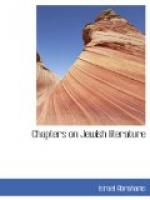The Talmud is accordingly not one work, but two, the one the literary product of the Palestinian, the other, of the Babylonian Amoraim. The latter is the larger, the more studied, the better preserved, and to it attention will here be mainly confined. The Talmud is not a book, it is a literature. It contains a legal code, a system of ethics, a body of ritual customs, poetical passages, prayers, histories, facts of science and medicine, and fancies of folk-lore.
The Amoraim were what their name implies, “Expounders,” or “Discoursers”; but their expositions were often original contributions to literature. Their work extends over the long interval between 200 and 500 C.E. The Amoraim naturally were men of various character and condition. Some were possessed of much material wealth, others were excessively poor. But few of them were professional men of letters. Like the Tannaim, the Amoraim were often artisans, field-laborers, or physicians, whose heart was certainly in literature, but whose hand was turned to the practical affairs of life. The men who stood highest socially, the Princes of the Captivity in Babylonia and the Patriarchs in Palestine, were not always those vested with the highest authority. Some of the Amoraim, again, were merely receptive, the medium through which tradition was handed on; others were creative as well. To put the same fact in Rabbinical metaphor, some were Sinais of learning, others tore up mountains, and ground them together in keen and critical dialectics.
The oldest of the Amoraim, Chanina, the son of Chama, of Sepphoris (180-260), was such a firm mountain of ancient learning. On the other hand, Jochanan, the son of Napacha (199-279), of dazzling physical beauty, had a more original mind. His personal charms conveyed to him perhaps a sense of the artistic; to him the Greek language was a delight, “an ornament of women.” Simon, the son of Lakish (200-275), hardy of muscle and of intellect, started life as a professional athlete. A later Rabbi, Zeira, was equally noted for his feeble, unprepossessing figure and his nimble, ingenious mind. Another contemporary of Jochanan, Joshua, the son of Levi, is the hero of many legends. He was so tender to the poor that he declared his conviction that the Messiah would arise among the beggars and cripples of Rome. Simlai, who was born in Palestine, and migrated to Nehardea in Babylonia, was more of a poet than a lawyer. His love was for the ethical and poetic elements of the Talmud, the Hagadah, as this aspect of the Rabbinical literature was called in contradistinction to the Halachah, or legal elements. Simlai entered into frequent discussions with the Christian Fathers on subjects of Biblical exegesis.




